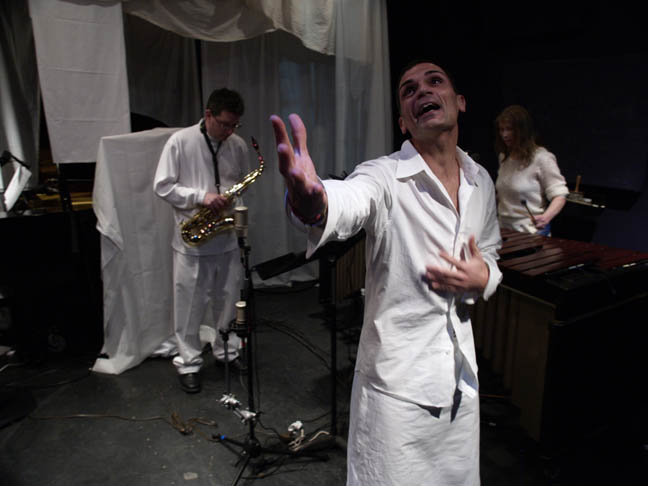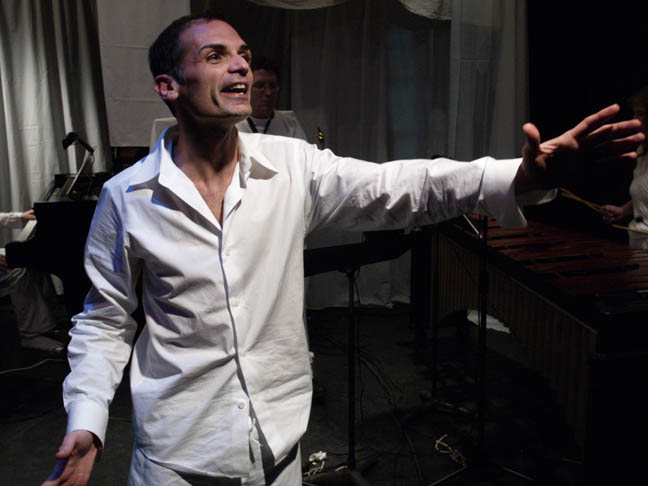Seeds of Change, Fruits of Labor: Zeitgeist and Wordless Music
Justin Schell describes performances by our own Zeitgeist (doing their "Shape Shifting") and New York's Wordless Music, a year-old troupe wowing critics back East. More is coming up from both of these groups; watch the Calendar for announcements.


Two concerts this weekend simultaneously evoked the past, present, and future of Twin Cities new music. Zeitgeist, ushering in its 30th season, performed the multimedia Shape Shifting: Shades of Transformation, while the Southern Theater inaugurated the Wordless Music Series, in collaboration with New York-based new music series Wordless Music.
Zeitgeist’s concerts marked the third time the group has performed Shape Shifting, which features poetry by Phillip Costaglioli, video by Ron Gregg, and music by Scott Miller, who was also live-processing the performers’ words and sounds at the concert. It was recorded for the American Composers Forum’s record label, Innova, and released in 2006.
True to its title, the work’s constitutive elements seemed to distrust fixity. It explores the realities of change and changes of reality. For instance, Miller’s drone for the work’s opening movement, “Apnée,” its edges burnished with metallic hues, places the dissonances in such a way that it is paradoxically full of restless activity.
Zeitgeist’s unique instrumentation was on full display with Shape Shifting. Percussionists Patti Cudd and Heather Barringer used an arsenal of instruments, but especially the marimba, to create textures that ranged from frantic in “Sainte Victoire” and “Dressing Up,” to the subdued and slightly eerie bells of “New Song,” the work’s conclusion. All the elements of Pat O’Keefe’s bass clarinet, its keys and mouthpiece as well as the traditional sounds it makes, seemed to take on a life of their own in “Mirror Inside,” while Shannon Wettstein’s piano in “Sainte Victoire” was transformed to sound like a John Cage prepared piano.
Gregg’s images evoked a kind of amorphous familiarity: train journeys, snowy scenes, clouds, and other everyday images transcended their quotidian status, their elements slightly recognizable but just unfocused enough to de-familiarize them. All of the performers were dressed in white, and they draped the back part of their studio with pieces of white cloth; projected on these surfaces, the images looked even more fractured.
Costaglioli’s dense, yet not overly opaque, poetry is woven throughout the work, creating its own complementary dimension of images. One lyrical leitmotif is Costaglioli’s wonderful image of “learning how to swim in the air.” In “Desire Has Its Own Geography,” the poet’s words themselves become sonic material to be transformed as Miller dissected, twisted, and stretched them, seemingly transforming even the identity of the poet himself, atop rustling electronics and bowed vibraphones. One of the few moments of rhythmic regularity, however, is aligned with one of Costaglioli’s darkest images, when he speaks of “cutting silk for my neck and stitching the shifting colors of despair” in the latter part of “Dressing Up.”
An apt metaphor for the entirety of Shape Shifting can be found in the inspiration for “Sainte Victoire.” Translated as “Holy Victory,” it is the Provence mountain which Paul Cézanne obsessively re-created more than 80 times, attempting to capture its subtle transformations over time. Zeitgeist itself has gone through a number of changes over the past 30 years, and it will take Shape Shifting to the Czech Republic for a series of concerts in October. On November 2, they will hold one of their frequent “Lowertown Listening Sessions” to share their experiences from the Czech Republic. This trip, however, is only one of many events planned for 2007 and 2008 to reflect and celebrate the group’s past and look ahead to its future.
DEDICATED TO contemporary instrumental music of all kinds, Wordless Music was founded in 2006 by Ronen Givony with an ear to demolishing value and genre boundaries that separate musics into “art,” “popular,” and “experimental.” Alex Ross, art music critic for The New Yorker, wrote in April that “at the moment, there is no more inventive music series in New York” than Wordless Music. Past and upcoming Wordless Music performances have included Radiohead guitarist Jonny Greenwood, the atmospheric Múm, multi-instrumentalist Andrew Bird, and collage-artists The Books.
Saturday night’s concert at the Southern was Wordless Music’s first outside of New York. Givony told me that he finds Minneapolis remarkable in “how many venues and performance spaces Minneapolis is home to—how many bands and artists come out of here, how rich the musical night life is, and how friendly and tightly knit the music scene and community is.” For his part, the Southern’s artistic director Jeff Bartlett said that Wordless Music is “so consistent with the kind of work that we want to do here, groundbreaking work that’s difficult to categorize.” He and Bartlett hope to collaborate on two, perhaps three Wordless Music concerts at the Southern Theater each year.
The concert Saturday night was supposed to feature New Yorker Nico Muhly and the Icelandic musician and composer Valgeir Sigurdsson, who has been one of Björk’s main collaborators since 1998. In another instance of the Minneapolis-St. Paul airport police making headlines, a customs officer grew suspicious of Sigurdsson’s bags of microphones and other musical equipment and promptly sent him back to Europe on the next flight. No amount of lobbying could convince the authorities that this Icelander posed no threat to national security. Overcoming this and other adversities (including violinist Lisa Liu dropping and breaking her violin), the inaugural Wordless Music concert at the Southern was nothing short of a success.
The musicians performing on Saturday, including Muhly himself on piano, keyboards, laptop, and percussion, performed four pieces of Sigurdsson’s that they could play in his absence, and added more of Muhly’s works than originally planned. These two composers are intimately familiar with each other’s work. He and Muhly met while both working on Björk’s Medulla, and have gone on to collaborate each other’s albums, Muhly’s Speaks Volumes (Bedroom Community, 2007) and Sigurdsson’s Ekvilibrium (Bedroom Community, 2007).
Muhly’s casual, conversational demeanor made the Southern feel like a nightclub . In listening to Muhly’s music, you can hear many of his minimalist predecessors, composers such as Steve Reich, Philip Glass, La Monte Young, Terry Riley, Meredith Monk, Tony Conrad, John Adams, yet Muhly doesn’t sound derivative. On the absolutely gorgeous A Hudson Cycle, for solo piano, the undulating chordal repetitions are marked by unexpected harmonic and percussive lilts, as well as aching dissonances. Period Instrument and Keep In Touch gave violist Nadia Sirota a chance to display her virtuosity on an instrument with little solo repertoire. Muhly also displayed his piano skills on Skip Town. Muhly played catch-up with a pre-recorded piano in a piece reminiscent of Conlon Nancarrow’s hyper-rhythmic player piano experiments.
This weekend of new music shows the tangible results that groups like Zeitgeist and others have achieved over the past three decades. Zeitgeist can hopefully look forward to another 30 years, and series like Wordless Music can continue to build on one of the most supportive and well-known new music scenes in the country. In the meantime, however, let’s hope that the members of Zeitgeist have better experience with customs and that Wordless Music isn’t scared away from coming back to Minneapolis.